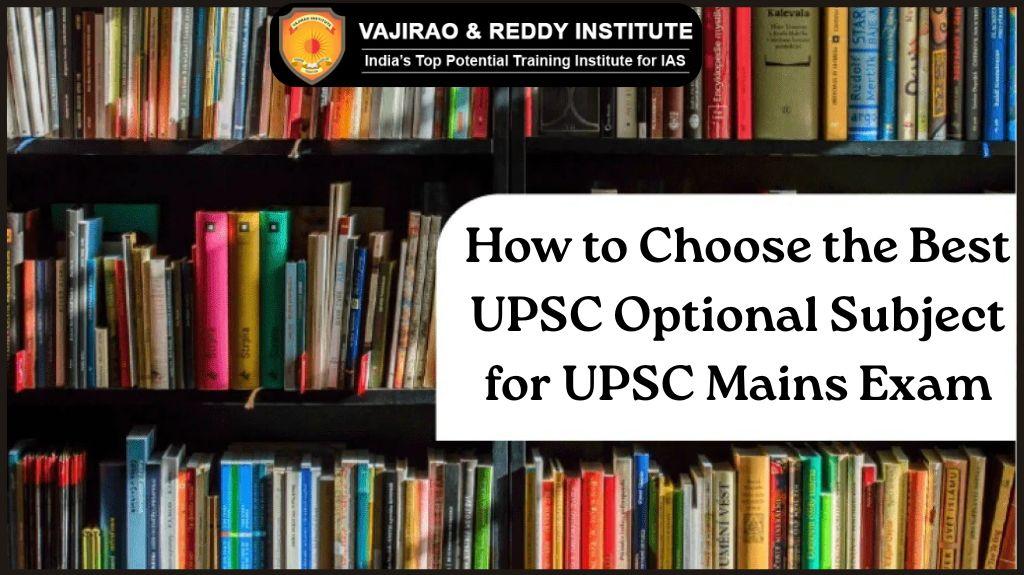Selecting the best optional subject for the UPSC Mains Exam is easily one of the trickiest calls an aspirant faces. Although the paper now carries only 500 out of the 1750 marks, the marks obtained in the optional can still sway a candidate's final position. So, a calm, informed choice that matches the current syllabus, personal strengths, genuine interests, and available study materials remains vital.
UPSC Mains Optional Paper selection process
Read on as Vajirao and Reddy IAS Institute elaborate on the IAS Mains Optional Paper selection process as per the latest UPSC Syllabus.
1. Understanding the Role of Optional Papers in UPSC Mains
The UPSC Mains consists of nine papers, with two of them, viz., Paper VI and VII, being the chosen optional subject, and each is worth 250 marks. Together, that lifts the weight of the option to a solid 500. Scoring well here can catapult a candidate up the list and, in some cases, aid the candidate in securing coveted posts like IAS or IFS.
2. Refer to the Latest UPSC Syllabus
Before you pick any optional subject, make sure to read the recent syllabus in the yearly UPSC Mains notification. That document spells out exactly what topics you must study, showing how wide and deep the knowledge is required. From there, compare side by side to see which matches your earlier studies and personal interests.
The UPSC offers 48 options to select from, including Literature papers for many regional languages. However, public administration, geography, sociology, anthropology, PSIR, history, and philosophy are still among the most favoured subjects.
3. Key Factors to Consider While Choosing an Optional Subject
Enumerated below are some key factors to consider while choosing an Optional Subject for the UPSC Mains Exam-
a. Academic Background and Subject Familiarity
If a candidate studied a discipline during graduation or post-graduation, a groundwork already exists, and fresh revision feels less burdensome. A person trained in History, Political Science, or even Engineering can therefore pick up the syllabus faster than someone tackling the topic for the first time.
b. Interest and Aptitude
Personal enthusiasm must also weigh heavily in the choice. Optional preparation needs long hours, complicated reading, and relentless rethinking, so real enjoyment keeps energy high. When the theme feels like too much hard work, momentum drains quickly, and the schedule collapses.
c. Scoring Trends and Performance of the Subject
Although the UPSC itself avoids labels such as high-scoring or low-scoring optional papers. However, toppers and coaching centres still publish patterns that hint at average marks for every optional. Yet those objective data points can shift from year to year and should never replace personal comfort and curiosity as the deciding parameter. Candidates should wisely treat scoring trends as rough starting points rather than fixed destinations.
d. Overlapping with General Studies Papers
Optional Subjects like Political Science, Sociology, Geography, and History connect heavily with GS Papers I, II, III, the Essay, and even Ethics. Picking one of them can save hours of study time and lift scores across those papers.
e. Availability of Resources and Guidance
Study materials, coaching, mentors, and regular test series can make a huge difference. Subjects like Law or Philosophy, however, may lack widely accepted notes, leaving students with no background at a serious disadvantage.
f. Length and Manageability of the UPSC Syllabus
Some optional courses are expansive, constantly changing outlines, for instance, History or Geography, while others like Philosophy or Anthropology stay tighter and steadier. Candidates should honestly judge how many hours a week they can spare before settling on a paper.
4. Popular Optional Subjects and Their Characteristics
-
Sociology: Sociology offers clear ideas, and sits well with Essay Paper and GS Subjects.
-
Geography: Geography shares a lot with GS, yet it still demands work on both physical features and human geography. That balance lets science and art students alike tackle it with equal ease.
-
Public Administration: Public Administration is also a high-scoring subject, tying in with GS II and Ethics.
-
PSIR (Political Science & International Relations): Political Science and International Relations share a big chunk with GS II, feed on fresh current news, and are a staple for humanities aspirants.
-
History: History feeds GS I and essay writing but asks for heavy memorising and time; be ready for a long haul.
-
Philosophy: Philosophy is compact, stays mostly conceptual, and suits anyone comfortable with abstract ideas.
-
Literature Subjects: Language literature papers can be scored if you read deeply, analyse sharply, and command the chosen tongue.
- Anthropology: Anthropology scores well and has a lean syllabus, plus it links closely with GS I-Society. Its mix of science and human insight attracts many medical and allied health graduates.
5. Mistakes to Avoid
Following Toppers Blindly: Just because a topper swears by one method or book, that formula may not work for you. Read your strengths, doubts, and situation before copying another person's road map.
Choosing Based on Trends Alone: Today, everyone talks about a trending subject, yet what scored big yesterday may not be the case tomorrow.
Final Thoughts
Once you have narrowed the options to two or three, dig into the full UPSC syllabus for each. Read a couple of chapters or any introductory notes to get a real taste of the optional subject for UPSC. Check how easily you can find books, online materials, mentors, and realistically note the hours each will demand. Finally, speak with seniors, teachers, or candidates who have been through the process.
Thus, picking the right option for the UPSC Mains Exam is both a personal call and a smart move. Matching your choice to the current UPSC Syllabus, your interests, past study, and the support around you matters. A sensible option lifts exam scores and keeps you spirited through the long haul.

